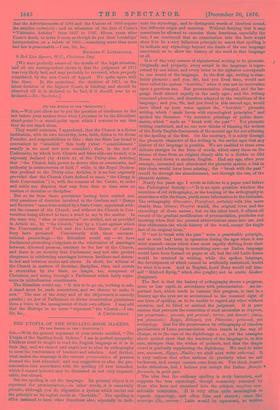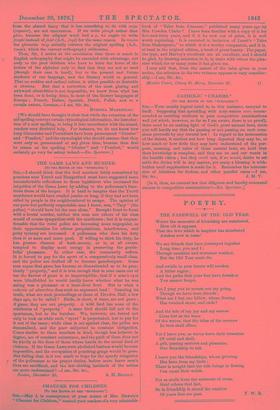THE UTOPIA OF THE SPELLING-BOOK MAKERS.
[To THE EDITOR OF THE " SFEOTITOR.1
SIR,—With the general argument of your article entitled, "The Utopia of the Spelling-book Makers," I am in perfect sympathy. Children must be taught to read the English language as it is in their day, and we cannot and ought not to alter its orthography to meet the convenience of teachers and scholars. And further, what makes the language is the current pronunciation of persons deemed the best educated ; and any suggestion to alter the pro- nunciation into accordance with the spelling (if ever intended, which I cannot believe) may be dismissed as not only impracti- cable, but absurd.
But the spelling is not the language. Its primary object is to represent the pronunciation,—in other words, it is essentially phonetic, although you do stigmatise a system which carries out 1
the principle to its logical result as "horrible." The spelling is often &gamed to have other functions also, especially to indi-
cate the etymology, and to distinguish words of identical sound, but different origin and meaning. Without denying that it may sometimes be allowed to exercise these functions, especially the- last, I am convinced that an examination into the facts would show it to be a very fallacious principle to assert that spelling is- to indicate any etymology beyond the limits of the one language concerned, or to show the history of the word in that language at all.
It is of the very essence of alphabetical writing to be phonetic. Originally and properly, every sound in the language is repre- sented by one letter, and every letter in the alphabet corresponds- to one sound of the language. In the first age, writing is abso- lutely phonetic ; and you, Sir, had you lived then, would not have called the system "horrible," when it was not an innovation, upon a previous one. But pronunciation changed, and the lan- guage itself altered rapidly in the early ages ; and the writing remained phonetic, and therefore adapted to the variations of the language ; and you, Sir, had you lived in this second age, would have lifted up your voice against the "horrible" phonetic writing, which "made havoc with etymological principles," and spoiled the literature "by eccentric printings of public docu- ments, which" made us "break with the past " ! Yet phonetic writing continued, and no one now thinks of blaming the writers of the Early English documents of the second age for not adhering to the spelling of the first. On the contrary, it is solely through the phonetic character of the writing in the earlier ages that any history of the language is possible. We are enabled to trace. even delicate changes in the form of words, which carry them on the- stream of time from an original closely akin to a Gothic or Old Norse word down to modern English. Had any age, after your example, execrated and abandoned the phonetic system, a link in this chain would have been missing; the "break with the past" would be through the abandonment, not through the use, of the phonetic system.
Nearly ten years ago I wrote as follows in a paper read before the Philological Society :—" It is an open question whether the retention of old orthography, or the keeping of the orthography in accordance with the times, yields more information to the historian. The orthography Gloucester, Pontefract, certainly tells him more clearly than Gloster, Pomfret would, the original form and the etymology of those names ; but on the other hand, it effaces all record of the gradual modification of pronunciation, precludes our knowing when first the present abbreviations came into use, and thus obliterates the whole history of the word, except the single fact of its original form."
If "not to break with the past" were a practicable principle, and as such had been in operation daring the ages when it was most wanted—those which were most rapidly shifting from their- moorings and advancing to something new—no Italian language- would have been formed on paper at all, but the old Latin forms would be retained in writing, while the spoken language, the development of which cannot be artificially restrained, would be what it is now. And in English, Lord Bury would call him- self " Hlfiford Byrig," which dhte (ought) not to excite hleahtor (laughter).
The fact is that the history of orthography shows a progress, more or less rapid, in accordance with pronunciation. An im- portant fact, which tends to restrain this progress, is that in a literary age the eyes are so accustomed to the constant sight of one form of spelling, as to be unable to regard any other without aversion, and to blind or mislead the judgment. It is pure custom that prevents the correction of such anomalies as diagram, yet programme ; precede, yet proceed; terror, yet honour; fancy, yet phantastic ; Egypt, Ethiopia, yet Phcenicia ; primeval, yet archteology. Zeal for the preservation by orthography of obsolete peculiarities of Latin pronunciation often stands in the way of change, as in the ease of the diphthongs te, cr, yet the examples above quoted show that the tendency of the language is, in this case, stronger than the wishes of pedants, and that the simple vowel is gradually supplanting the diphthong. We used to write sera, muswum, 2Egypt, 2Emilia; we shall soon write esthetical. It is very curious that other nations do precisely what we call barbarous, and escape censure even from us. You think fonettik looks ridiculous, but I believe you accept the Italian flosofo, fisonomta, in good part.
The idea that the ordinary spelling is truly historical, and suggests the true etymology, though commonly assumed by those who have not examined into the subject, requires con- siderable restriction. It is very often quite meaningless as regards etymology, and often false and absurd ; cases like sovereign (It., sovrano ; Latin would be superanus), so written
from the absurd fancy that it has something to do with reign (regnare), are not uncommon. If we write plough rather than plow, because the original word had a g, we ought to write fought instead of fowl (A.S., fugl) for the same reason. In tongue the phtmetic tung actually restores the original spelling (A.S., tunge), which the current orthography obliterates.
Thus, Sir, I arrive at the conclusion that there is much in English orthography that might be amended with advantage, not only to the poor children Who have to learn the force of the letters of the alphabet only to find that they are not so used (though their case is hard), but to the present and future students of our language, and the literary world in general. That no sudden and radical reform is either possible or desirable is obvious. But that a correction of the most glaring and awkward absurdities is not impossible, we know from what has been done, or is being done, in most of the literary languages of Europe ; French, Italian, Spanish, Dutch, Polish, and to a certain extent, German.—I am, Sir, &c., RUSSELL MARTINEAU.
[We should have thought it clear that while the retention of the old spelling conveys certain etymological information, the introduc- tion of a new spelling, to bring it into accordance with the sound, renders very doubtful help. For instance, we do not know how long Gloucester and Pontefract have been pronounced "Gloater" and "Pomfret," and the etymologist who should assume that they were only so pronounced at any given time, because then first he comes on the spelling " Gloster " and "Pomfret," would certainly go very far astray indeed.—En. Spectator.]



































 Previous page
Previous page